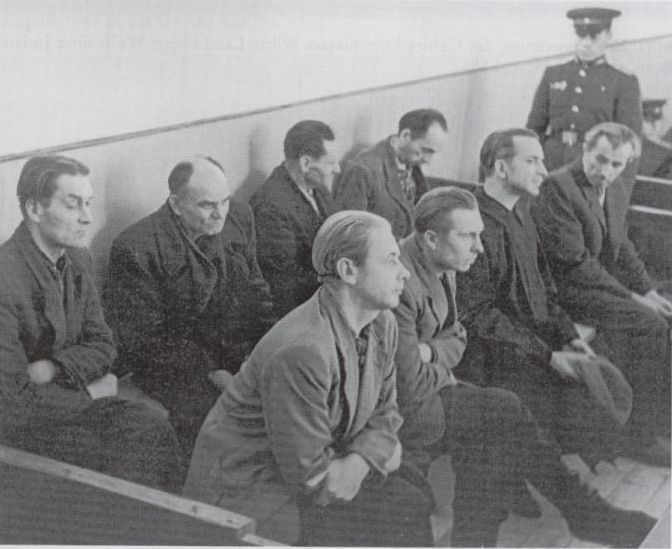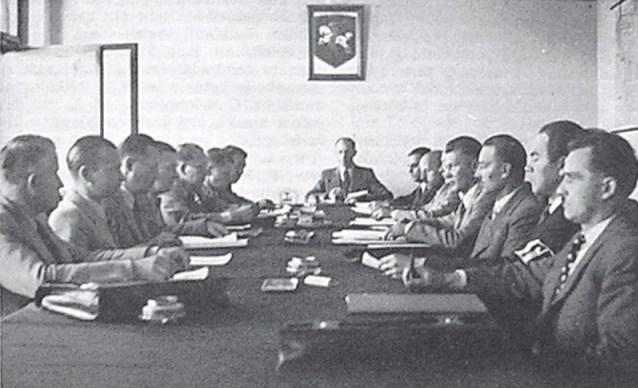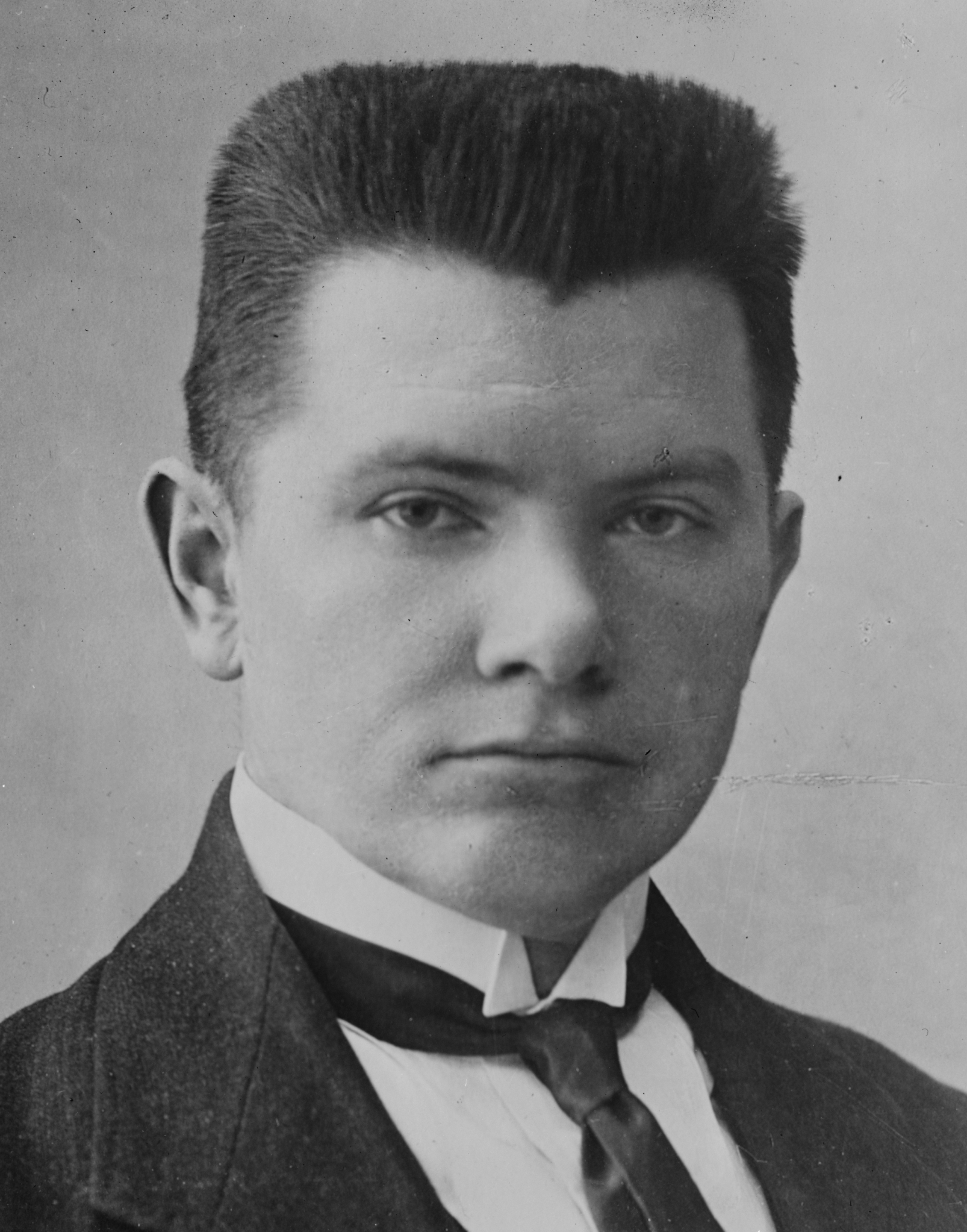|
Lithuanian TDA Battalion
The Lithuanian TDA (; ) Battalion or simply TDA, was a paramilitary battalion organized in June–August 1941 by the Provisional Government of Lithuania at the onset of Operation Barbarossa. Members of the TDA were known by many names such as Lithuanian auxiliaries, policemen, white-armbands, nationalists, rebels, partisans, resistance fighters or . TDA was intended to be the basis for a future independent Lithuanian Army, but it was taken over by Nazis and reorganized into the Lithuanian Auxiliary Police Battalions. The original TDA eventually became the 12th and the 13th Police Battalions. These two units took an active role in mass killings of the Jews in Lithuania and Belarus. According to the Jäger Report, the TDA battalion's members killed about 26,000 Jews between July and December 1941. Formation As Nazi Germany declared war on the Soviet Union and invaded Lithuania, the Provisional Government of Lithuania declared independence on June 23, 1941. Lithuanians hoped to resto ... [...More Info...] [...Related Items...] OR: [Wikipedia] [Google] [Baidu] |
Provisional Government Of Lithuania
The Provisional Government of Lithuania () was an attempted temporary government, provisional government to form an independent Lithuanian state in June Uprising in Lithuania, the last days of the Soviet occupation of Lithuania (1940), first Soviet occupation and the first weeks of the German occupation of Lithuania during World War II, German occupation of Lithuania during World War II in 1941. It was secretly formed on 22 April 1941, announced on 23 June 1941, and dissolved on 5 August 1941. It was formed by members of the Lithuanian Activist Front (LAF) in Kaunas and Vilnius. History The Lithuanian Activist Front announced the creation of the provisional government on 22 June 1941, as the June Uprising in Lithuania began. The Nazi regime envisioned Lithuania as a future part of Greater Germanic Reich, Greater Germany, and was not much interested in Lithuanian independence. It did allow the Provisional Government to operate while it was useful. Literary historian Juo ... [...More Info...] [...Related Items...] OR: [Wikipedia] [Google] [Baidu] |
Rollkommando Hamann
''Rollkommando'' Hamann () was a small mobile unit that committed mass murders of Lithuanian Jews in the countryside in July–October 1941, with an estimated death toll of at least 60,000 Jews. The unit was also responsible for many murders in Latvia from July through August 1941. At the end of 1941 the destruction of Lithuanian Jewry was effectively accomplished by Hamann's unit in the countryside, by the Ypatingasis būrys in the Ponary massacre, and by the Tautinio Darbo Apsaugos Batalionas (TDA) in the Ninth Fort in Kaunas. In about six months an estimated 80% of all Lithuanian Jews were killed. The remaining few were spared for use as a labor force and concentrated in urban ghettos, mainly the Vilna and Kaunas Ghettos. Organization The group consisted of 8–10 Germans from '' Einsatzkommando 3'', commanded by SS-''Obersturmführer'' Joachim Hamann, and several dozen Lithuanians from the 3rd company of the TDA, commanded by Bronius Norkus. The unit had no permanent s ... [...More Info...] [...Related Items...] OR: [Wikipedia] [Google] [Baidu] |
Red Army
The Workers' and Peasants' Red Army, often shortened to the Red Army, was the army and air force of the Russian Soviet Republic and, from 1922, the Soviet Union. The army was established in January 1918 by a decree of the Council of People's Commissars to oppose the military forces of the new nation's adversaries during the Russian Civil War, especially the various groups collectively known as the White Army. In February 1946, the Red Army (which embodied the main component of the Soviet Armed Forces alongside the Soviet Navy) was renamed the "Soviet Army". Following the dissolution of the Soviet Union it was split between the post-Soviet states, with its bulk becoming the Russian Ground Forces, commonly considered to be the successor of the Soviet Army. The Red Army provided the largest land warfare, ground force in the Allies of World War II, Allied victory in the European theatre of World War II, and its Soviet invasion of Manchuria, invasion of Manchuria assisted the un ... [...More Info...] [...Related Items...] OR: [Wikipedia] [Google] [Baidu] |
Wehrmacht
The ''Wehrmacht'' (, ) were the unified armed forces of Nazi Germany from 1935 to 1945. It consisted of the German Army (1935–1945), ''Heer'' (army), the ''Kriegsmarine'' (navy) and the ''Luftwaffe'' (air force). The designation "''Wehrmacht''" replaced the previously used term (''Reich Defence'') and was the manifestation of the Nazi regime's efforts to German rearmament, rearm Germany to a greater extent than the Treaty of Versailles permitted. After the Adolf Hitler's rise to power, Nazi rise to power in 1933, one of Adolf Hitler's most overt and bellicose moves was to establish the ''Wehrmacht'', a modern offensively-capable armed force, fulfilling the Nazi regime's long-term goals of regaining lost territory as well as gaining new territory and dominating its neighbours. This required the reinstatement of conscription and massive investment and Military budget, defence spending on the arms industry. The ''Wehrmacht'' formed the heart of Germany's politico-military po ... [...More Info...] [...Related Items...] OR: [Wikipedia] [Google] [Baidu] |
Tver
Tver (, ) is a types of inhabited localities in Russia, city and the administrative centre of Tver Oblast, Russia. It is situated at the confluence of the Volga and Tvertsa rivers. Tver is located northwest of Moscow. Population: The city is situated where three rivers meet, splitting the town into northern and southern parts by the Volga, and divided again into quarters by the Tvertsa River, which splits the left (northern) bank into east and west halves, and the Tmaka River which does the same along the southern bank. Tver was formerly the capital of a powerful medieval state and a model provincial town in the Russian Empire, with a population of 60,000 by 14 January 1913. The city was known as Kalinin () from 1931 to 1990. Etymology According to one hypothesis, the name of the city is of Finnic languages, Finnic origin, ''*Tiheverä''. History Medieval origins Tver's foundation year is officially accepted to be 1135.Charter of Tver, Article 1 Originally a minor se ... [...More Info...] [...Related Items...] OR: [Wikipedia] [Google] [Baidu] |
Pskov
Pskov ( rus, Псков, a=Ru-Псков.oga, p=psˈkof; see also Names of Pskov in different languages, names in other languages) is a types of inhabited localities in Russia, city in northwestern Russia and the administrative center of Pskov Oblast, located about east of the Estonian border, on the Velikaya, Velikaya River. Population: Pskov is one of the oldest cities in Russia. During the Middle Ages, it served as the capital of the Pskov Republic and was a trading post of the Hanseatic League before it was incorporated into the Grand Duchy of Moscow and became an important border fortress in the Tsardom of Russia. History Early history Pskov is one of the oldest cities in Russia. The name of the city, originally Pleskov (historic Russian spelling , ), may be loosely translated as "[the town] of :wikt:purling, purling waters". It was historically known in English as Plescow. Its earliest mention comes in 903, which records that Igor of Kiev married a local lady, Olga ... [...More Info...] [...Related Items...] OR: [Wikipedia] [Google] [Baidu] |
Soviet Partisans
Soviet partisans were members of Resistance during World War II, resistance movements that fought a Guerrilla warfare, guerrilla war against Axis powers, Axis forces during World War II in the Soviet Union, the previously Territories of Poland annexed by the Soviet Union, Soviet-occupied territories of interwar Poland in 1941–45 and eastern Finland. The activity emerged after Nazi Germany's Operation Barbarossa was launched from mid-1941 on. It was Central Headquarters of the Partisan Movement, coordinated and controlled by the Soviet government and modeled on that of the Red Army. The partisans made a significant contribution to the war by countering German plans to exploit occupied Soviet territories economically, gave considerable help to the Red Army by conducting systematic attacks against Germany's rear communication network, disseminated political rhetoric among the local population by publishing newspapers and leaflets, and succeeded in creating and maintaining feelings ... [...More Info...] [...Related Items...] OR: [Wikipedia] [Google] [Baidu] |
Eight Members Of TDA On Trial In 1961
8 (eight) is the natural number following 7 and preceding 9. Etymology English ''eight'', from Old English '', æhta'', Proto-Germanic ''*ahto'' is a direct continuation of Proto-Indo-European '' *oḱtṓ(w)-'', and as such cognate with Greek and Latin , both of which stems are reflected by the English prefix oct(o)-, as in the ordinal adjective ''octaval'' or ''octavary'', the distributive adjective is '' octonary''. The adjective ''octuple'' (Latin ) may also be used as a noun, meaning "a set of eight items"; the diminutive '' octuplet'' is mostly used to refer to eight siblings delivered in one birth. The Semitic numeral is based on a root ''*θmn-'', whence Akkadian ''smn-'', Arabic ''ṯmn-'', Hebrew ''šmn-'' etc. The Chinese numeral, written ( Mandarin: ''bā''; Cantonese: ''baat''), is from Old Chinese ''*priāt-'', ultimately from Sino-Tibetan ''b-r-gyat'' or ''b-g-ryat'' which also yielded Tibetan '' brgyat''. It has been argued that, as the cardinal ... [...More Info...] [...Related Items...] OR: [Wikipedia] [Google] [Baidu] |
Hilfspolizei
The ''Hilfspolizei'' (''HiPo'' or ''Hipo''; meaning "auxiliary police") was a short-lived auxiliary police force in Nazi Germany in 1933. The term was later semi-officially used for various auxiliary organizations subordinated to the ''Ordnungspolizei'' as well as various military and paramilitary units set up during World War II in German-occupied Europe. Hipo 1933 Hermann Göring, newly appointed as Interior Minister of Prussia, established the Hilfspolizei on 22 February 1933 to assist regular police in maintaining order and later in handling communists in the wake of the Reichstag fire. The organization quickly spread from Prussia to other states of Germany, German states and Hitler endorsed it in the Reichstag Fire Decree. The units were staffed mainly by members of Sturmabteilung (SA) and Allgemeine SS wearing SA or SS uniforms with a white brassard. It is estimated that the auxiliary units had 25,000 SA and 15,000 SS members. The units also included members of ''Der Stahlh ... [...More Info...] [...Related Items...] OR: [Wikipedia] [Google] [Baidu] |
Franz Lechthaler
Franz may refer to: People * Franz (given name) * Franz (surname) Places * Franz (crater), a lunar crater * Franz, Ontario, a railway junction and unorganized town in Canada * Franz Lake, in the state of Washington, United States – see Franz Lake National Wildlife Refuge Businesses * Franz Deuticke, a scientific publishing company based in Vienna, Austria * Franz Family Bakeries, a food processing company in Portland, Oregon * Franz-porcelains, a Taiwanese brand of pottery based in San Francisco Other uses * ''Franz'' (1971 film), a Belgian film * Franz (2025 film), an upcoming biographical film of Franz Kafka * Franz Lisp, a dialect of the Lisp programming language See also * Frantz (other) Frantz may refer to: * Frantz (given name), a masculine given name (and list of people with the given name) * Frantz (surname), a surname (and list of people with the surname) * Frantz (''Coppélia''), a character in ''Coppélia'' * ''Frantz'' ( ... * Franzen (disamb ... [...More Info...] [...Related Items...] OR: [Wikipedia] [Google] [Baidu] |
Gestapo
The (, ), Syllabic abbreviation, abbreviated Gestapo (), was the official secret police of Nazi Germany and in German-occupied Europe. The force was created by Hermann Göring in 1933 by combining the various political police agencies of Free State of Prussia, Prussia into one organisation. On 20 April 1934, oversight of the Gestapo passed to the head of the ''Schutzstaffel'' (SS), Heinrich Himmler, who was also appointed Chief of German Police by Hitler in 1936. Instead of being exclusively a Prussian state agency, the Gestapo became a national one as a sub-office of the (SiPo; Security Police). From 27 September 1939, it was administered by the Reich Security Main Office (RSHA). It became known as (Dept) 4 of the RSHA and was considered a sister organisation to the (SD; Security Service). The Gestapo committed widespread atrocities during its existence. The power of the Gestapo was used to focus upon political opponents, ideological dissenters (clergy and religious org ... [...More Info...] [...Related Items...] OR: [Wikipedia] [Google] [Baidu] |
Iron Wolf (organization)
Iron Wolf () was a semi-official Lithuanian militarized organization active in 1928–1930, led by Prime Minister Augustinas Voldemaras. Established at the end of 1927 by the ruling Lithuanian Nationalist Union to help suppress its opposition, it was inspired by the Blackshirts, an Italian fascist organization. The organization was secret; it was officially a sports union from May 1928. The organization spied on its political opponents, engaged in limited physical coercion, and launched propaganda initiatives. It had more than 4,000 members. When Voldemaras was removed as Prime Minister in September 1929, Antanas Smetona attempted to install his men. When that failed, the organization was officially closed on 24 May 1930. However, supporters of Voldemaras remained active and became known as '' Voldemarininkai'' ("Voldemarians", "Voldemarists"). They planned several anti-Smetona coups, became increasingly sympathetic to fascism, and often collaborated with Nazis during the Ge ... [...More Info...] [...Related Items...] OR: [Wikipedia] [Google] [Baidu] |







